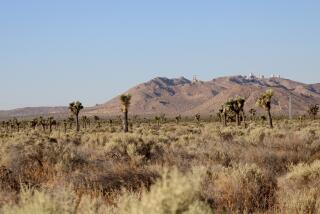Blythe Solar project in Riverside County gets federal approval
- Share via
A proposed solar plant that would be the largest in the world and double the solar electricity capacity in the U.S. got the go-ahead from federal regulators Monday to begin construction.
The Blythe Solar Power Project, backed by German company Solar Millennium, won final clearance from the Bureau of Land Management, making the project the first of its kind to be approved on federal public land.
The planned installation, set for more than 7,000 acres in Riverside County, is designed to deliver 1 gigawatt of power using parabolic trough technology. The process involves curved mirrors that gather the sun’s rays, heating liquid that creates steam to run generators.
The multibillion-dollar Blythe project is to consist of four separate 250-megawatt sections that together will be able to power more than 300,000 average homes — even up to 750,000 residences, by some generous estimates.
The groundbreaking should happen by the end of the year, Solar Millennium said, noting that it was in “advanced discussions” with the Energy Department to secure $1.9 billion in government debt financing for the first two portions of the project, as similar projects have done.
Construction is expected to create more than 1,000 jobs, as well as thousands more throughout the supply chain, the company said. Once built, the plant will support nearly 300 permanent jobs.
To address environmental concerns, regulators are requiring that Solar Millennium provide funding to support more than 8,000 acres of habitat for native species such as the desert tortoise, the western burrowing owl, the bighorn sheep and the Mojave fringe-toed lizard.
The Blythe installation is the sixth in recent months to be approved for public land. Several proposed solar plants have been fast-tracked through the permitting process as they race to meet the December deadline for federal stimulus funds. One of those, the Ivanpah Solar Electric Generating System, is breaking ground near Primm, Nev., on Wednesday.
More to Read
Inside the business of entertainment
The Wide Shot brings you news, analysis and insights on everything from streaming wars to production — and what it all means for the future.
You may occasionally receive promotional content from the Los Angeles Times.











